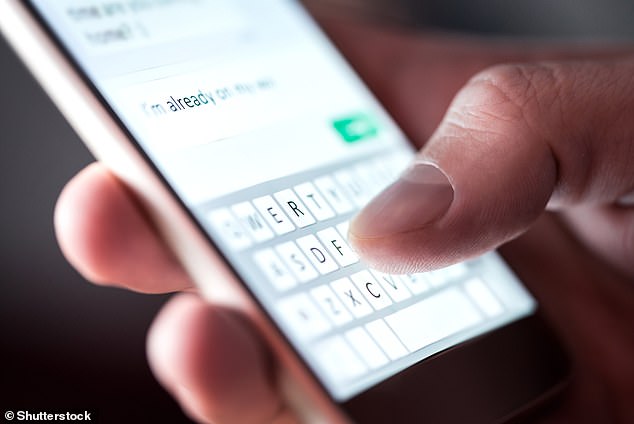Sending a message via text can be a social minefield, with endless opportunities to be misinterpreted and misread.
But there’s one that all users should avoid if they want to keep recipients happy, according to a study.
And the controversial single-letter reply is commonly used by dads everywhere.
According to the results, ‘k’ is the worst text message you can send, frequently driving recipients into a rage.
If you send it, the person on the other end could think you’re rude, detached, disinterested, or worse.
The single letter often signals ’emotional distance, passive-aggression, or outright disinterest’, Fast Company reports.
Despite its brevity, ‘k’ can shut down a conversation and even send the recipient ‘spiraling’ into an emotional fury.
Other unpopular replies include ‘sure’, ‘okay’ and the dreaded single question mark.

According to the results, ‘k’ is the worst text message you can send, frequently driving recipients into a fury (file photo)
The study, published in the International Journal of Mobile Communication, found ‘k’ was worse than other similarly short replies like ‘ok’ and ‘sure’.
‘K’ was even worse than being left ‘on read’ – which is where the recipient has seen the message but opted not to respond.
‘K’ is an abbreviation of ‘OK’ or ‘okay’, which both tend to be interpreted as more neutral or formal compared with the single letter version.
Interestingly, adding an extra letter to make ‘kk’ was perceived to soften the tone, making it seem less like the sender was annoyed, for example.
For senders, ‘k’ is just a quick and simple way of acknowledging someone’s message or giving the affirmative.
Its meaning is akin to a quick thumbs-up, although it comes without the positive connotation of the cheery hand gesture.
But it seems some people deliberately use the ‘k’ reply to annoy the recipient and show them that they’re disinterested or don’t care.
Like ‘lol’ and ‘cool’, ‘k’ is also termed a ‘dead-end’ reply because they do not help keep the conversation running.

‘K’ has been ranked as the most negatively received response in digital conversations, according to the study
Commentators on X (Twitter) weighed in on the use of ‘k’ in a message, with one user calling it ‘too aggressive’.
Someone else called it ‘the digital equivalent of slamming the door while making dead eye contact’.
Another said: ‘K is short for ‘you’re dead to me’, while someone else posted: ‘I never understood why people would just text “K” or “Kk”‘.
However, one advocate of the single-letter response said: ‘I’ve learned that rather than replying with a wall of text explaining how you feel, you should just type ‘K’ and hit send.
‘No sense in wasting your valuable words.’
According to American psychologist Dr Rachel Christopher, getting short or vague text messages like ‘k’ can create anxiety.
‘When we receive a vague text, like “k”, the information required to give that message context is missing,’ she said in a blog post.
‘This frees our brain up to run wild and make up whatever meaning it would like.’
Sometimes the negative perception of text messages can depend on the context – such as a dating context.
According to another survey by experts at FindingTheOne.com, the worst messages to send on dating apps are ‘hey’ or ‘hi’, ‘how are you?’ and ‘what are you up to?’.
But others include ‘you up?, ‘you free tonight?’ and cheesy pick-up lines such as ‘did it hurt when you fell from heaven?’.
Also included were dead-end replies such as ‘k’ and ‘lol’ which can give the impression that the sender wants the conversation to end.
